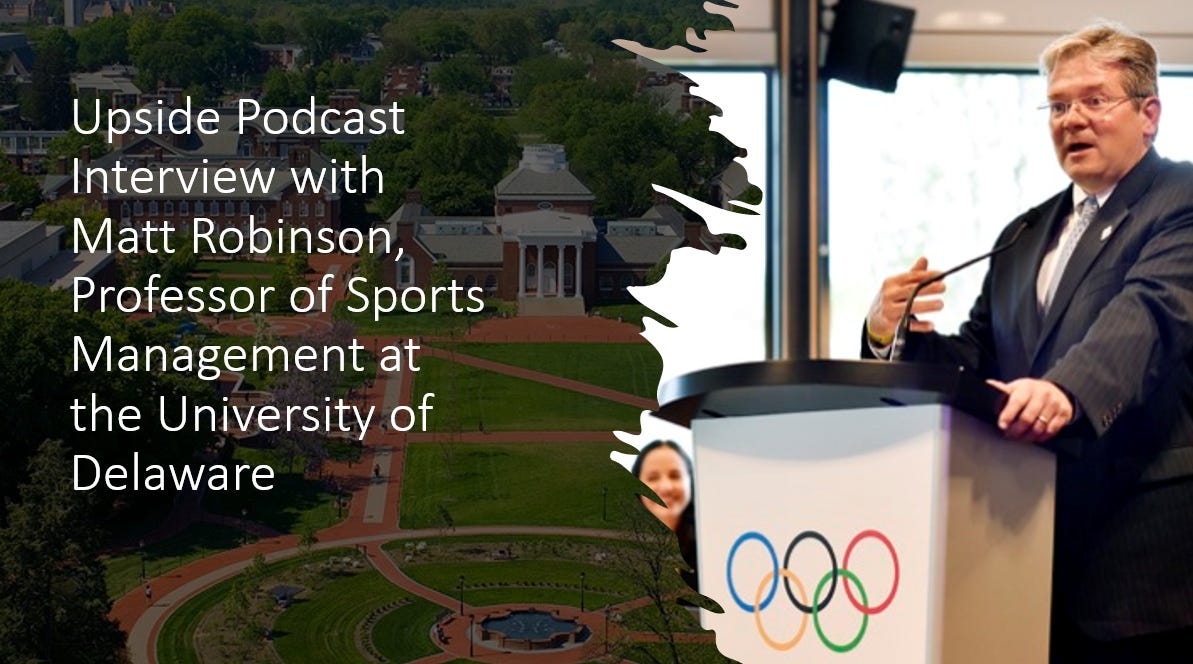This week we had the honor to interview Matt Robinson, Professor of sports management at the University of Delaware. He is also in charge of an international coaching program, funded by the international Olympic committees, Olympic solidarity fund as well as the United States Olympic committee. Matt has worked with major sports leagues (NBA..), and has done research studies for US soccer and different Sports and Federations around the world.
Show Notes: Through this interview, we touched on his background, the best practices for soccer training, the differences between soccer in the US and in Europe. We also touched on the 2026 FIFA World Cup in the US, and how well he things the US Men soccer team will do at the upcoming 2022 FIFA World Cup in Qatar.
Best Quotes: Here are some of the key discussion points and best quotes from our conversation with Matt:
On his background:
“I've been a professor now for over 25 years and it was about 20 years ago that I got involved with doing international work. I am currently in charge of an international coaching program funded by the international Olympic committees, the Olympic solidarity fund as well as the United States Olympic committee. And it's directed towards coach development around the world. So in that program over the past, we've had 14 classes and we've worked with over 350 coaches from over 120 countries in 24 different sports”.
“It's really opened my eyes to sports in all other parts of the world, other cultures, other countries developing nations versus underdeveloped nations and some of the challenges and opportunities. And it's been a great opportunity to reflect upon the us environment in comparison to what's being done in other Countries”.
,On which Federation or countries he believes are the most advanced when it comes to soccer’s player development and training:
“I think there are a couple things that come into play that aren't even sports or soccer related. First you talk about macro variables, and you start talking about not only GDP and population and so forth, but also world governance indicators. We did a study and looked at basically if a country is effective, meaning if it's government is effective. And the fact that often the government is very involved in sports in other countries, is going to impact how sports is in this country”.
“So of course, when you take a look at your traditional powers, so soccer nations like Germany, England, Brazil, and Argentina. They have a head start there. I mean in Brazil, soccer is not a sports, it's a religion. And in Germany, there is a similar type of phenomenon and in England as well because soccer was born there”.
“And so when you take a look at the United States, you had countries that had a century head start on us. So when you talk about the United States soccer movement, you could claim that the first real generation was in the seventies when there was a push to bring soccer to mainstream in the United States.
On how the German soccer federation reevaluated everything in the late 90ies which led them to win a Soccer World Cup after that:
“So if you take a look at a Germany and what they did, and there's a great book called do reboot, after they flamed out in the European championships in the late nineties, early two thousands. They went back and reevaluated what they were doing and made some significant changes that ultimately led to them winning a world cup”.
“The one thing that they did was that they developed these regional centers to identify and keep their elite players in their local clubs. And they had these regional centers that were staffed by Federation people. And so players from clubs were invited into these sites. They were being evaluated. They were playing against better players. They invited the staff members to come and watch the training. So they knew, and understood the expectations of a national team”.
And I think the other thing that they did was to open up in terms of who was allowed into the national player pool. At that point, I believe there was a restriction on who could come into the national team. And I think you had to be a national born German citizen”.
“Boateng and Mesut Özil were great examples of that change. And some of their best players that helped them win that world cup probably wouldn't have been eligible for that team before. Germany also does an amazing job in the incorporation of sports sciences into what they're doing with the training and tracking of players. They also do an excellent job in terms of the development of their coaches and the certification of their coaches. Germany, and the DFP has a headquarter and they also have amazing facilities around the country”.
On his opinion on training when it comes to US soccer:
“I always talk about “what developmental stage are we talking about when it comes to the dos and dot’s of training?” I just think that one of the biggest weaknesses in the US is that in our developmental stages, we put such an emphasis on winning over player development and I am not here to say that winning is not important, but it is about winning at the sake of players’ development. And so I think that training should be about giving young players the love for the game”.
“I think one of the things that you see today is that a lot of players who don't love the game are playing because they have to versus because they love to. And then I think that the second thing is about introducing intensity to the training so that the games are easy”.
“I think it is important to put players under pressure in training so that the real game becomes easier. (..) And when the players are 10 or 12 years old, it should be more about them developing as players and improving themselves and then raising their level of game”.
You may also like:
🔮 2022 Upside Top Sports Tech Predictions (NFT/Metaverse, Sports Performance, IPOs/M&As..)
🔗 🔥 Upside Analysis: NFTs Vs Crypto Vs Digital Currency, How Are They Different?
🔥 Upside Chat: Dave Hancock, CEO, Apollo (Leading Athlete Management Systems (AMS) vendor)
🔥Upside Chat: Alexi Pianosi, Strengths and Conditioning Coach, Pittsburgh Penguins (NHL)
🔥Upside Chat: Pierre Barrieu, High Performance Director, Toronto FC (MLS)













Share this post